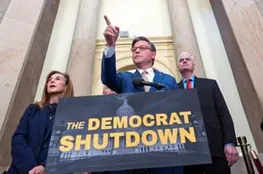Former President Donald Trump, on the campaign trail, has committed to dismantling the federal Department of Education and expanding school choice, a concept with bipartisan support according to recent polls. If Trump returns to the White House, he has the potential to realize both objectives. Critics argue that the Department of Education has long been an unconstitutional institution, its creation perhaps at odds with the Tenth Amendment, as 'education' is not mentioned in the Constitution. Despite trillions of dollars in spending since its establishment in 1980, student performance has shown little improvement. The department's inception was linked to Jimmy Carter’s administration, as a concession to the nation’s teachers' unions.
Trump proposes allowing states to control their own educational systems by eliminating the department. Redirecting its budget to the states could enhance local governance and reduce wasteful Washington bureaucracy. Simultaneously, Trump supports the Educational Choice for Children Act (ECCA), setting the stage for a nationwide school-choice initiative independent of the federal Education Department. In a recent interview, Trump indicated his willingness to approve the bill which would establish a federal tax-credit scholarship program. This would incentivize taxpayers to contribute to K-12 scholarship funds, as demonstrated by the 69% voter support for such measures in recent surveys, including majorities from both political parties.
The ECCA has already cleared a significant hurdle, passing the House Ways and Means Committee with Republican support. This historic movement marks the first time a national school-choice proposal has advanced beyond the committee stage in Congress. The bill offers tax incentives for private donations to K-12 scholarship organizations, funding that can be used for private tuition, tutoring, and educational resources. This model has precedence; twenty-one states, including Florida, have successfully implemented similar programs. Florida’s extensive use of tax-credit scholarships since 2001 has correlated with improved educational standings, despite lower-than-average spending per student.
The nationwide endorsement of school choice aims to elevate educational standards by fostering competition, which has been shown to improve public school outcomes. With substantial Republican backing, the next step is for the ECCA to advance to a House vote. Its passage suggests potential reforms that could decentralize education further, provided Republicans gain control of the Senate after the forthcoming elections and maintain their House majority.
Although the ECCA faces obstacles in the Democrat-led Senate, widespread voter support indicates a shift towards school choice. Teachers' unions remain significant opponents, primarily aligning with Democratic positions against these changes. However, pending electoral successes, particularly with Trump at the helm, could see the plan gaining traction by 2025, leading to a broader transfer of educational authority to the states and potentially the abolition of the federal Department of Education.
























